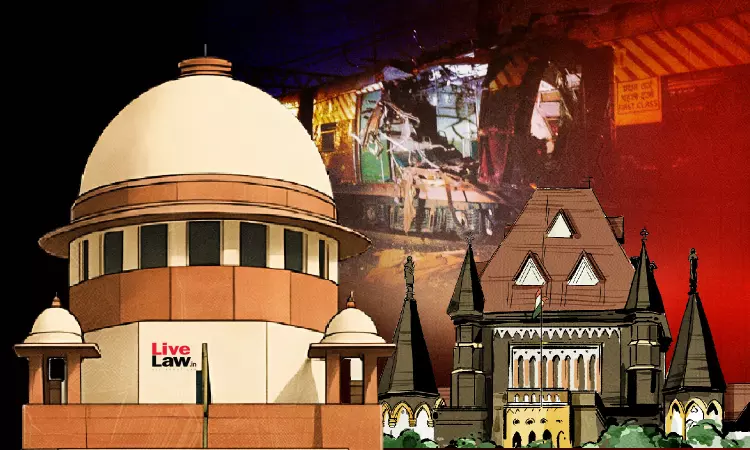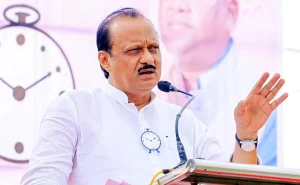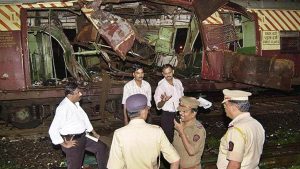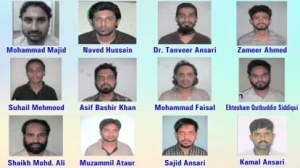Maharashtra – Maharashtra Deputy Chief Minister Ajit Pawar‘s statement regarding the Supreme Court verdict in the 2006 Mumbai train blasts case has created significant political controversy. Ajit Pawar On Mumbai Train Blasts Ruling emphasized that “some innocent people were also trapped in this case,” adding that “no innocent should be punished, and no guilty should be let off.” This comment has raised eyebrows across political circles, particularly given that the state government has challenged the Bombay High Court’s decision to acquit all 12 accused in the case.
The timing and content of Ajit Pawar On Mumbai Train Blasts Ruling statement has assumed special significance ahead of elections to the cash-rich Brihanmumbai corporation, with many political observers viewing his remarks as a potential deviation from the government’s official stance on the case.
Supreme Court Freezes High Court Decision

The Supreme Court today put the Bombay High Court’s decision on freeze, though it did not bar the release of the accused individuals. The top court also clarified that the High Court’s judgment will not be considered as a precedent in cases filed under the state’s anti-terror and anti-organised crime law MCOCA (Maharashtra Control of Organised Crime Act).
Ajit Pawar On Mumbai Train Blasts Ruling came shortly after the Supreme Court made its decision, when he told reporters: “We cannot say much about the Supreme Court’s order. Some innocent people were also trapped in this case… We believe no one should face injustice… But those who are guilty must be punished… We are not against anyone… But we do not support anyone either.”
Government’s Appeal Strategy


Despite his controversial comments, Ajit Pawar On Mumbai Train Blasts Ruling also confirmed the government’s commitment to challenging the High Court verdict. He stated: “The government has decided to appeal against the Bombay High Court’s verdict… Our Chief Minister had made the stance clear… We will present good lawyers in the Supreme Court and identify the shortcomings in the High Court proceedings.”
This dual approach in Ajit Pawar On Mumbai Train Blasts Ruling – acknowledging potential innocence while pursuing legal challenges – has created confusion about the government’s actual position on the case and raised questions about internal disagreements within the state administration.
Political Implications and Electoral Context
Many political analysts have concluded that the Deputy Chief Minister’s comment construes a deviation, however tiny, from the government’s official stance in the case. Ajit Pawar On Mumbai Train Blasts Ruling has assumed particular significance given the approaching elections to the Brihanmumbai corporation, where such statements could influence voter sentiment and political alliances.


The controversy surrounding Ajit Pawar On Mumbai Train Blasts Ruling is not the first instance where the Deputy Chief Minister’s statements have raised eyebrows. He had also previously suggested a diplomatic approach to the language row affecting non-Marathi people, another deviation that attracted political attention.
Language Row Comments Add to Controversy
In addition to Ajit Pawar On Mumbai Train Blasts Ruling, the Deputy Chief Minister also addressed the ongoing language controversy in Maharashtra. He suggested that non-Marathi people caught in the crosshairs of the language row should adopt a conciliatory approach, stating: “The language of the state you live in should be respected… From Maharashtra to Jammu and Kashmir, everyone should be proud of their mother tongue.”
Pawar’s solution involves asking non-Marathi speakers to politely explain their situation: “People living here who do not know Marathi — they should say politely that ‘We do not know Marathi, we are learning it’. If you say this, then there will be no problem.”
Background of the 2006 Mumbai Train Blasts Case


The case that prompted Ajit Pawar On Mumbai Train Blasts Ruling stems from the devastating 2006 Mumbai train blasts. The Bombay High Court had overturned the special court’s judgment, which originally sentenced five of the 12 accused to death while giving the rest life imprisonment. One of the accused on death row died in 2021.
The accused individuals came from diverse backgrounds, including a former call centre employee, a seller of unani medicines, a software engineer, a key maker, and a chicken seller. Many were allegedly connected to the banned organisation SIMI and accused of receiving training in Pakistan while helping Pakistani terrorists with logistics support.
High Court’s Reasoning for Acquittal

The Bombay High Court’s decision that necessitated Ajit Pawar On Mumbai Train Blasts Ruling was based on serious concerns about the case’s foundation. The court determined that the case against the accused was built on coerced confessions and testimonies from unreliable witnesses.
Additionally, the High Court found that material evidence, including recovered materials and explosives, were “vulnerable to tampering” and therefore inadmissible in court. This comprehensive rejection of the prosecution’s case led to the acquittal of all 12 accused individuals.
Future Legal Proceedings
The controversy generated by Ajit Pawar On Mumbai Train Blasts Ruling will likely continue as the case proceeds through the Supreme Court. The state government’s decision to present experienced lawyers and identify shortcomings in the High Court proceedings suggests a prolonged legal battle ahead.
The Deputy Chief Minister’s balanced approach in Ajit Pawar On Mumbai Train Blasts Ruling – advocating for both justice for the innocent and punishment for the guilty – reflects the complex nature of terrorism cases where establishing guilt beyond reasonable doubt remains challenging while ensuring innocent individuals are not wrongfully convicted.

